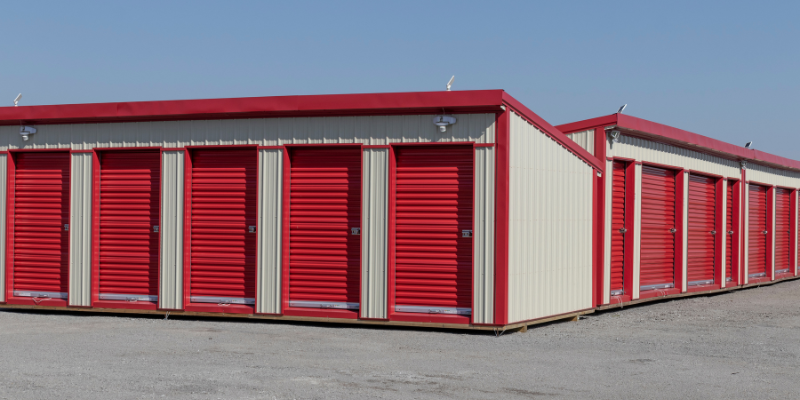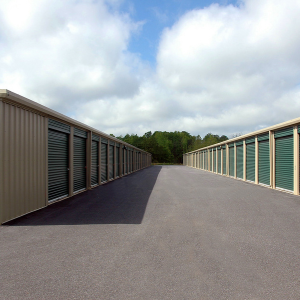
Understanding the Self Storage Market: Trends and Opportunities
The self-storage market has grown significantly, owing to factors such as urbanization, increased consumer goods accumulation, and an increase in small businesses looking for low-cost storage options. Selling your self-storage complex may be a viable option as demand increases.
Key trends include the use of technology to improve security and management efficiencies, as well as the increased importance of climate-controlled units due to customer preferences. Self-storage facilities attract investors due to their resilience during economic fluctuations and lower operational costs compared to other real estate investments.
Understanding market trends can help you strategically position your property without the need for a realtor. By seizing these opportunities, you can increase profitability while capitalizing on the sector’s upward trend.
Evaluating Your Self-Storage Complex: Key Factors to Consider

When evaluating your self-storage complex for sale in the real estate market, several important factors must be considered in order to maximize the value of your property without the assistance of a realtor. Consider the location, as proximity to urban centers or high traffic areas can impact demand and pricing.
Examine occupancy rates and rental income streams as key indicators of financial health and buyer appeal. Consider the facility’s condition; well-maintained units with updated security systems and amenities like climate control tend to command higher prices.
Analyze local market trends and competition to determine your property’s position within the market. Furthermore, assess operational efficiencies and management effectiveness, as streamlined operations can pique buyer interest by promising lower overhead expenses.
Understanding these key elements will enable you to strategically position your self-storage facility for a successful sale in a competitive real estate market.
Preparing Your Self-Storage Facility for Sale: Essential Steps
Preparing your self-storage facility for sale independently demands careful attention to detail and thoughtful planning. Initially, confirm that your property is in excellent condition by attending to any required maintenance or repairs, while also improving curb appeal to draw in prospective buyers.
Perform a comprehensive review of financial records and occupancy rates to illustrate stable revenue streams, essential for highlighting the profitability of your complex. Establishing well-structured documentation of operating expenses, tax records, and lease agreements will enhance transparency and foster trust with potential buyers.
Highlighting unique selling points such as location advantages, security features, or technological upgrades can effectively distinguish your self-storage facility in the competitive real estate market. Compiling a comprehensive portfolio that includes detailed photographs and virtual tours allows for effective marketing of your property to interested parties who may be considering an investment independently.
Financial Documentation Required for Selling Your Self-Storage Business
When selling your self-storage complex without a realtor in a competitive real estate market, thorough financial documentation is critical for attracting potential buyers. Create detailed profit and loss statements that clearly outline revenue streams, operating expenses, and net income over multiple years.
This financial transparency provides buyers with a clear picture of the company’s profitability and operational performance. Additionally, create balance sheets to display assets, liabilities, and owner equity, which will provide insight into the company’s overall financial health.
Do not overlook the last three years’ tax returns, as they validate reported earnings and increase buyer confidence. Include rent rolls, detailed unit occupancy rates, and rental income trends to demonstrate consistent cash flow.
Add these documents to any existing leases or contracts with tenants or service providers to ensure that buyers understand their current obligations. Finally, create an inventory of physical assets, such as security systems and maintenance equipment, to highlight capital investments that boost property value.
Thorough financial documentation not only expedites negotiations, but also establishes your self-storage business as a viable real estate investment opportunity.
How to Determine the Right Asking Price for Your Self-Storage Property
Setting an appropriate asking price for your self-storage property in a competitive real estate market requires a strategic approach. Begin by looking at recent sales of comparable properties and focusing on key metrics like location, size, occupancy rates, and amenities.
Consider how current market trends and economic conditions may affect the value of your property. To establish a realistic valuation, you must first evaluate your facility’s financial performance, which includes revenue streams and operating expenses.
Researching industry reports and using online valuation tools can help determine a fair price. Pay attention to distinguishing features that may increase your property’s appeal, such as advanced security systems or climate-controlled units, as these can justify a higher asking price.
By carefully evaluating these factors, you can position your self-storage complex competitively without relying on a realtor’s expertise.
Creating an Attractive Listing for Your Self-Storage Facility
When selling your self-storage complex without a realtor, creating an appealing listing is critical for capturing the attention of potential buyers in the competitive real estate market. Highlight key features of the facility, including location, security measures, and occupancy rate.
Include high-quality photographs of well-kept units and common areas to give buyers a clear picture of what they’re buying. Give detailed descriptions of amenities such as climate-controlled rooms, 24-hour access, and advanced security systems.
Clearly state financial performance metrics such as annual revenue, net operating income, and potential for growth or expansion. Highlighting unique selling points, such as proximity to major highways or urban centers, can increase investor interest in strategic acquisitions.
To reassure buyers about the property’s legal standing, make sure your listing includes all relevant zoning regulations and local building codes. By carefully preparing your listing with detailed information and appealing visuals, you increase your chances of receiving serious inquiries from qualified buyers looking for investment opportunities in the self-storage industry.
Marketing Strategies for Selling a Self-Storage Complex Independently

When selling a self-storage complex on your own, developing effective marketing strategies is critical for attracting potential buyers without the help of a realtor. To position your property competitively, begin with a market analysis to understand current trends and pricing.
To reach a larger audience, use commercial real estate listing websites like LoopNet or Crexi. High-quality photographs and detailed descriptions that emphasize key features such as security systems, unit sizes, and occupancy rates can help your listing stand out.
Use social media channels and targeted online advertising to attract the attention of investors looking for profitable opportunities. Networking with local business groups and attending industry events can also lead to valuable connections with potential clients.
Consider offering virtual tours or drone footage to provide potential buyers with an immersive experience of your facility, allowing them to visualize the potential of their investment without the need for a realtor’s intervention.
Leveraging Online Platforms to Sell Your Self-Storage Complex
In today’s digital landscape, utilizing online platforms is crucial for marketing your self-storage complex independently of a realtor. Leveraging well-known real estate websites and marketplaces, including LoopNet or Crexi, can greatly enhance your property’s exposure to prospective buyers.
Develop an engaging listing featuring high-resolution images and comprehensive descriptions that emphasize essential attributes such as security systems, occupancy rates, and advantages of the location. Social media platforms such as Facebook and LinkedIn provide effective tools for reaching a wider audience through targeted advertisements and groups dedicated to real estate investment opportunities.
Furthermore, participating in online forums and communities focused on commercial real estate can facilitate direct connections with potential investors. Optimizing your online presence with search engine optimization (SEO) techniques will ensure that your listing appears prominently in search results when potential buyers are looking for investment opportunities in the self-storage sector.
Using digital tools strategically can streamline the sales process and attract serious inquiries from qualified buyers, especially commercial property buyers actively looking for properties like yours.
Networking with Potential Buyers: Building Connections in the Industry
Networking with potential buyers is an important strategy for selling your self-storage complex without a realtor. Making strong connections in the real estate industry can greatly improve your chances of finding the right buyer.
Begin by attending industry events, conferences, and local meetups, where you can interact directly with investors and other property owners. Use online real estate forums and platforms to identify motivated buyers looking for self-storage investment opportunities.
Establishing relationships with commercial real estate professionals, such as brokers or consultants, can provide valuable insights and referrals, even if you don’t use them directly. Participating in property-focused social media groups allows you to promote your self-storage facility and attract serious buyers.
By utilizing these networking strategies, you can build a pipeline of potential buyers who are actively looking for properties like yours in the competitive real estate market.
Legal Considerations When Selling a Self-Storage Business Without a Realtor
When selling a self-storage complex without a realtor, it’s essential to understand the laws thoroughly so that the sale proceeds smoothly, especially in a self-storage sale involving a partnership dispute or other complex issues that require a legal expert’s guidance. First and foremost, sellers need to do their homework to make sure they own the property outright, as any liens or other problems could stop a sale from happening.
You need to know all the zoning laws and land use rules that could affect the sale or future operations of the storage facility. In addition, landlords need to review and update their rental agreements with tenants to make sure they follow local landlord-tenant laws.
Hiring a skilled real estate lawyer can help you write or review contracts and make sure that all of the terms are fair and legally binding. Sellers should also know that they have to tell buyers about any problems with the property. If they don’t, they could end up in court.
Finally, knowing how taxes affect the sale of commercial real estate can help sellers avoid unexpected costs. This is why it is important for sellers to work closely with financial advisors who know a lot about real estate transactions.
Effective Negotiation Techniques for Private Sales of Commercial Properties
When selling your self-storage complex without a realtor, mastering negotiation techniques is essential for a successful private sale in today’s competitive real estate market. Begin by conducting extensive research on the market value of comparable commercial properties in order to establish a realistic asking price that will appeal to potential buyers.
Establishing rapport with interested parties promotes open communication and understanding of buyer needs. Prepare to highlight your property’s unique features and benefits, such as security systems or high occupancy rates, in order to justify your pricing strategy.
Use active listening to effectively address concerns while remaining flexible, allowing for changes that satisfy both parties. Crafting a clear and compelling narrative about your self-storage facility’s investment potential can also help it gain traction.
Make strategic concessions, such as offering flexible financing options or extending due diligence periods, to facilitate agreement without jeopardizing key terms. Being patient yet assertive during negotiations ensures that you maintain control while also fostering a collaborative environment conducive to a successful closing.
How to Handle Offers and Counteroffers Without a Realtor
Handling offers and counteroffers in the sale of your self-storage complex without a realtor necessitates strategic negotiation abilities and a thorough understanding of the real estate market. Begin by carefully reviewing each offer you receive, paying particular attention to the proposed price, contingencies, and financing terms.
Understanding current market trends is essential for determining whether an offer is in line with the value of your property. When considering counteroffers, it is critical to clearly define your bottom line and be willing to negotiate on terms that are both flexible and favorable.
Communicate directly with potential buyers or their representatives while remaining professional and transparent throughout the negotiation process. Use digital tools and platforms to improve communication and document exchange efficiency.
Staying informed and proactive allows you to effectively manage offers and counteroffers, maximizing the profitability of your self-storage complex sale without the need for a realtor’s expertise.
Closing the Deal: Finalizing the Sale of Your Self-Storage Complex

Closing the deal on your self-storage complex without the help of a realtor entails several critical steps to ensure a smooth transaction in the real estate market. Begin by thoroughly reviewing and finalizing all necessary documentation, including the purchase agreement and any relevant disclosures, to protect both parties.
Consult with a qualified real estate attorney who can provide expert legal advice and ensure compliance with local regulations. Conduct a thorough inspection of the property to identify any potential issues that may arise during the negotiations.
To secure financing, work with lenders who are familiar with self-storage investments and understand their specific characteristics. Prioritize clear communication with the buyer to avoid misunderstandings and build trust throughout the process.
Establish an escrow account to ensure the safe handling of funds until all conditions are met. Pay close attention to due diligence periods, giving buyers enough time to evaluate financial statements and verify property performance metrics like occupancy rates and revenue streams.
By meticulously managing these elements, you can successfully sell your self-storage complex in today’s competitive real estate market without the help of a realtor.
Tax Implications of Selling Commercial Real Estate Independently
When selling a self-storage complex independently in the real estate market, it is critical to understand the tax implications. Without a realtor, you are responsible for navigating complicated tax issues.
Commercial real estate sales are typically subject to capital gains tax, which is calculated on the difference between the sale price and the original purchase price. It is critical to determine whether these gains are short-term or long-term, as this influences the tax rate applied.
Sellers should be aware of depreciation recapture, which may increase taxable income by taxing previous depreciation deductions at higher rates. For those considering reinvestment options such as a 1031 exchange, keep in mind that you can defer capital gains taxes if you reinvest in similar properties within certain timeframes.
Furthermore, independent sellers must account for any state or local taxes levied on their transactions. When selling without the assistance of a realtor, consulting with a tax professional or accountant who specializes in commercial real estate can help ensure compliance and optimize financial outcomes.
Common Pitfalls When Selling a Commercial Property on Your Own
In a competitive real estate market, selling a self-storage complex without a realtor can be hard, especially for people who don’t know much about how commercial property deals work. One common mistake is not doing enough market research to set the right price for the property, which can lead to undervaluation or overpricing that keeps buyers away.
Also, sellers often don’t realize how important it is to have complete legal documentation, which can cause negotiations to stall or lead to future disputes. Another problem is marketing the property well; if you don’t have professional networks and resources, it can be hard to find qualified investors.
Also, many private sellers don’t have the skills needed to understand complicated financial evaluations and buyer qualifications, which could cause deals to fall through at later stages. Mistakes in these areas can not only slow down sales but also cut into profits from what is usually a big investment in self-storage real estate.
How to Sell a Self-Storage Business?
Selling a self-storage business without a realtor in a competitive real estate market necessitates careful planning and execution. To determine the market value of your self-storage complex, start with a comprehensive valuation.
This includes reviewing financial statements, occupancy rates, and local market trends. Next, create detailed documentation that demonstrates the facility’s profitability, operational efficiency, and growth potential.
Marketing is essential; create targeted advertising campaigns that highlight unique selling points such as location benefits and amenities. Use online platforms and industry networks to connect with potential buyers who are actively looking for investment opportunities in the self-storage sector.
Consider hiring professional services, such as legal and financial advisors, to ensure regulatory compliance and negotiate favorable transaction terms. Negotiating directly with interested parties allows for personalized discussions about pricing and terms, allowing you to maximize your profits from the sale of your self-storage business without relying on a realtor’s real estate market expertise.
| MARKET PRICE | REAL-ESTATE BROKER | BUYERIS | VALUES | MONEY | FEES |
| DEBTS | DATA | RENTALS | RENTAL PROPERTIES | RISKS | ENVIRONMENTAL RISKS |
| ROI | RETURN ON INVESTMENT (ROI) | REITS | APPRAISAL | PROPERTY VALUATION | MARKETING CAMPAIGN |
| EXIT STRATEGY | MARKET DEMAND | PRIVACY | CAP RATE | SPACE | NEWS |
| MARKET VALUES | LICENSES | FUTURE VALUE | OPERATING PROFIT | DEMOGRAPHICS | CONSTRUCTION |
| AVERAGE | ACCESSIBILITY | THE SALE PRICE | ON THE MARKET | REAL ESTATE BROKER | A SELFSTORAGE PROPERTY |
| A REAL ESTATE BROKER |

